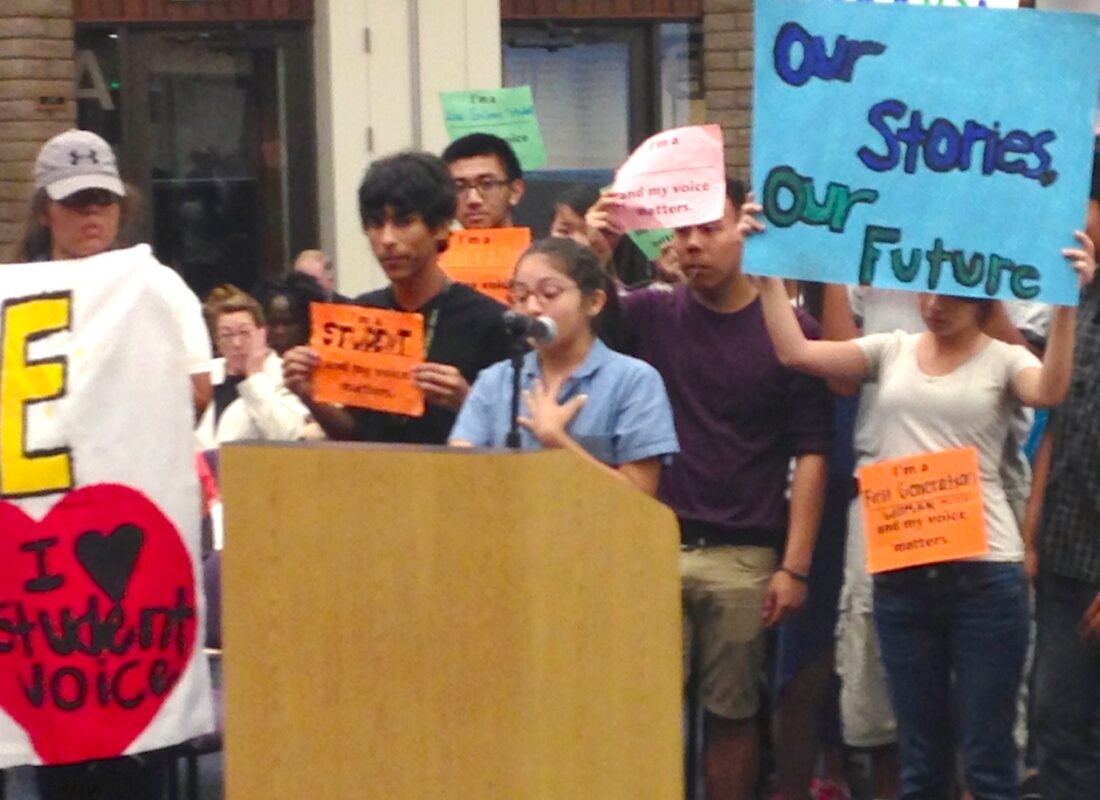
CREDIT: JOHN FENSTERWALD/EDSOURCE TODAY
Surrounded by other members of the student group Californians For Justice, Karla Rodriguez, a junior at James Lick High in San Jose, asks the East Side Union High School District school board to include students in the LCAP process during a meeting in May. The State Board of Education will consider amending LCAP regulations to require school districts to solicit the views of students.
Single word at heart of regulatory debate
August 28, 2014 | By John Fensterwald | No Comments
The State Board of Education next week will consider and possibly settle a debate over one word in the proposed final regulations for the Local Control Funding Formula. The decision would end a year-long disagreement between school districts and civil rights organizations over spending flexibility under the state’s new school funding formula.
The word at issue is “principally.” It would be in a section of regulations controlling the Local Control and Accountability Plan, the three-year budget and academic improvement plan that districts completed in June. It would spell out when districts can use money allotted for “high-needs” students – low-income students, students learning English and foster youths – for purposes that would benefit all students in a school or district. In those cases, districts would have to justify that the services and programs using that money would be “principally directed towards, and are effective in, meeting the district’s goals” for high-needs students. For example, a district could propose using funding for high-needs students to extend the academic day or offer summer school for all students who are behind. The district would have to show that such a use would help close the achievement gap for the high-needs students who must benefit from the extra money under the funding formula.
Advocates for low-income children, including Public Advocates, the ACLU and Children Now, lobbied to have “principally “ added to prevent districts from using money in ways that wouldn’t benefit high-needs students. Organizations representing districts and school administrators wanted the word taken out. In a July 3 letter to the state board, the California School Boards Association said that “principally” is subjective. “Its inclusion would likely confuse the public rather than make the LCAP more transparent,” it said. School board members predicted in testimony that including the word might lead to needless litigation.
The staff of the state board has sided with the advocates and left “principally” in the proposed regulations, while arguing that, really, it won’t make that much difference.
“We think ‘principally’ is consistent with the provision,” said Brooks Allen, deputy policy director and assistant legal counsel with the state board. “It provides a little more emphasis but does not substantially change the meaning. We don’t understand how this represents a significant change.”
There is more agreement among education and advocacy groups over the other final changes to the regulations that the state board staff is proposing.
One, strongly pushed by student activists who demonstrated at two state board meetings this year, would state that district administrators should seek the ideas of students when creating the LCAP – Single word at heart of regulatory debate | EdSource:
Chronic absenteeism bill faces veto threat
Legislation that would make it easier for the state and school districts to track chronic absenteeism, an early indicator of students at risk of dropping out, will soon reach Gov. Jerry Brown, where it faces an uncertain fate. [[ This is a content summary only. Visit the Edsource Today website for full links, other content, and more! ]]
